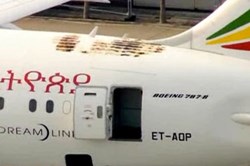Following 787 fire, time to repair carbon fiber fuselage
The fire on board the Ethiopian Airlines 787 presents Boeing with the challenge of a large composite repair project — possibly the largest of its kind.

Whatever the cause of the fire aboard the Ethiopian Airlines 787 Dreamliner parked at London's Heathrow International Airport on July 12, one thing is now clear: It's time for a major fuselage repair.
Throughout design and development of the 787, Boeing has wrestled with the question of detecting and repairing damage to composite aerostructures. Although fire damage on the Ethiopian plane is obvious, one of the challenges of composite structures is their ability to hide subsurface microcracking and delamination. Boeing and partners have developed a variety of technologies to find such hidden defects — mainly via non-destructive inspection using ultrasonic scanning and other methods.
This is half the challenge, however. Once a defect is detected, then the work of repair begins. This usually involves removing the defective material via cutting and machining, and then installing a composite, cured-in-place patch. The goal with repair is twofold: Remove the flawed material and generate a durable patch that maintains the strength and integrity of the larger structure.
Repairing a composite structure is, by itself, relatively simple and manageable, as long as it's confined to the skin structure. In such cases, the biggest hurdle is developing the equipment, material and expertise for composite repair among aircraft maintenance personnel who are used to working primarily with aluminum structures.
The damage to the Ethiopian Airlines craft represents, possibly, one of the largest composite repair projects in aerospace history. And because the fire burned from the inside out, repairing the fire-damaged fuselage is not as simple as cutting away the damaged skin section and fashioning a patch. Stringers and other sub-skin structures must be assessed, replaced and tested — all a first for Boeing.
Related Content
-
Combining multifunctional thermoplastic composites, additive manufacturing for next-gen airframe structures
The DOMMINIO project combines AFP with 3D printed gyroid cores, embedded SHM sensors and smart materials for induction-driven disassembly of parts at end of life.
-
Development of a composite liquid hydrogen tank for commercial aircraft
Netherlands consortium advances cryogenic composites testing, tank designs and manufacturing including AFP, hybrid winding, welding of tank components and integrated SHM and H2 sensors for demonstrators in 2025.
-
“Structured air” TPS safeguards composite structures
Powered by an 85% air/15% pure polyimide aerogel, Blueshift’s novel material system protects structures during transient thermal events from -200°C to beyond 2400°C for rockets, battery boxes and more.
















